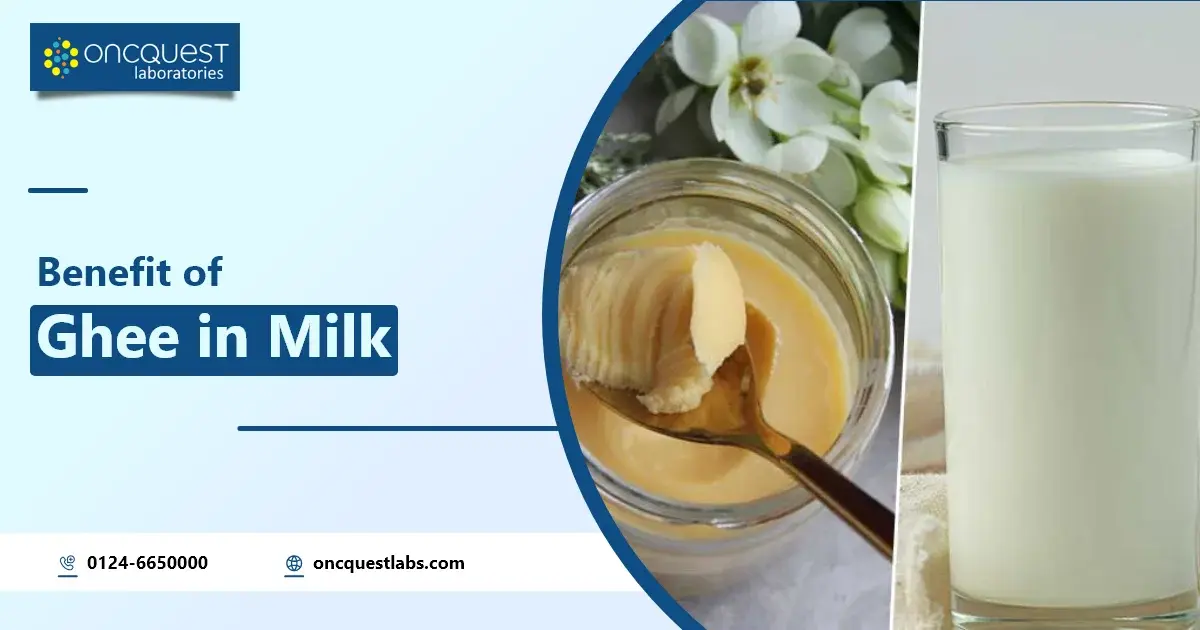The combination of ghee and milk is a cherished part of many culinary and wellness traditions. Ghee, a form of clarified butter rich in healthy fats and fat-soluble vitamins, has been used for centuries in traditional practices like Ayurveda. Milk, a staple in many diets, is a powerhouse of essential nutrients including high-quality proteins, calcium, and vitamins. When combined, ghee and milk create a nourishing drink that offers a wealth of health benefits.
This age-old remedy is praised for its potential to improve digestion, enhance immune function, and support overall vitality. It’s more than just a comforting beverage; it’s a holistic approach to health that has been passed down through generations. In this article, we delve into the benefits of consuming ghee in milk, exploring its impact on various aspects of health, from promoting digestive wellness to supporting skin and hair health. Discover how this simple yet potent combination can be a valuable addition to your daily routine, enhancing both physical and mental well-being.
Contents
- 1 Nutritional Value of Ghee in Milk
- 2 Benefits of Ghee in Milk
- 2.1 Enhanced Digestive Health
- 2.2 Boosted Immunity
- 2.3 Improved Skin and Hair Health
- 2.4 Stronger Bones and Teeth
- 2.5 Weight Management and Metabolism
- 2.6 Enhanced Mental Health and Cognitive Function
- 2.7 Energy and Vitality
- 2.8 Heart Health
- 2.9 Anti-inflammatory and Healing Properties
- 2.10 Ayurvedic Benefits and Dosha Balance
- 3 Side Effects of Drinking Milk with Ghee
- 4 Benefits of Drinking Milk with Ghee in Morning
- 5 Conclusion
- 6 FAQ
- 7 Can I drink milk with ghee every day?
Nutritional Value of Ghee in Milk
Below is a table summarizing the key nutritional components found in a typical serving of ghee and milk, highlighting the unique contributions of each:
| Nutrient | Ghee (1 tbsp) | Milk (1 cup, whole) | Combined Value |
| Calories | 112 kcal | 149 kcal | 261 kcal |
| Total Fat | 12.7 g | 7.9 g | 20.6 g |
| – Saturated Fat | 7.9 g | 4.6 g | 12.5 g |
| – Monounsaturated Fat | 3.7 g | 2.0 g | 5.7 g |
| – Polyunsaturated Fat | 0.5 g | 0.2 g | 0.7 g |
| Cholesterol | 33 mg | 24 mg | 57 mg |
| Protein | 0 g | 7.7 g | 7.7 g |
| Carbohydrates | 0 g | 11.7 g | 11.7 g |
| – Sugars | 0 g | 12.3 g | 12.3 g |
| Vitamin A | 1083 IU (54% DV) | 395 IU (20% DV) | 1478 IU (74% DV) |
| Vitamin D | 0.6 µg (3% DV) | 2.9 µg (15% DV) | 3.5 µg (18% DV) |
| Vitamin E | 0.4 mg (2% DV) | 0.1 mg (<1% DV) | 0.5 mg (2.5% DV) |
| Vitamin K | 1.1 µg (1% DV) | 0.6 µg (<1% DV) | 1.7 µg (2% DV) |
| Calcium | 0 mg | 276 mg (28% DV) | 276 mg (28% DV) |
| Phosphorus | 0 mg | 222 mg (22% DV) | 222 mg (22% DV) |
| Selenium | 0 µg | 8 µg (15% DV) | 8 µg (15% DV) |
| Butyric Acid | Present | Not present | Present |
| Conjugated Linoleic Acid (CLA) | Present | Not present | Present |
Benefits of Ghee in Milk
Enhanced Digestive Health
Ghee is a rich source of butyric acid, a short-chain fatty acid that is beneficial for intestinal health. Butyric acid acts as a healing agent for the gut lining, helping to reduce inflammation and promote a healthy digestive system. Ghee’s lubricating properties also facilitate smoother bowel movements, which can help prevent and relieve constipation. Milk, especially when warm, complements these benefits by providing a soothing effect on the stomach and aiding in the digestion of nutrients. The combination helps maintain a healthy digestive tract, reducing symptoms of indigestion and promoting regularity.
Boosted Immunity
Both ghee and milk contain essential nutrients that support the immune system. Ghee is rich in antioxidants such as vitamin E and vitamin A, which protect cells from oxidative stress and enhance immune function. Milk, particularly when fortified, provides vitamin D and calcium, which are crucial for immune health. The combination can help the body ward off infections and illnesses. Additionally, butyric acid in ghee has anti-inflammatory properties that can help modulate the immune response, further enhancing the body’s ability to fight off pathogens.
Improved Skin and Hair Health
The healthy fats and fat-soluble vitamins in ghee, including vitamins A, E, and K, are vital for maintaining skin and hair health. Ghee provides deep nourishment to the skin, helping to maintain its natural moisture barrier and promoting a healthy, glowing complexion. It can also reduce inflammation and soothe irritated skin. For hair, the fatty acids in ghee help nourish the scalp and strengthen hair follicles, reducing dryness and promoting hair growth. The protein and vitamins in milk complement these benefits by supporting overall skin and hair health.
Stronger Bones and Teeth
Milk is well-known for its high calcium content, which is essential for the development and maintenance of strong bones and teeth. When combined with ghee, which contains vitamin K2, the absorption of calcium is enhanced. Vitamin K2 helps direct calcium to the bones and teeth, preventing it from depositing in arteries and soft tissues. This synergy not only strengthens bones and teeth but also reduces the risk of osteoporosis and dental issues. The combination supports overall skeletal health, making it particularly beneficial for children and older adults.
Weight Management and Metabolism
Contrary to the common misconception that fats lead to weight gain, the healthy fats in ghee can support weight management. Ghee contains medium-chain triglycerides (MCTs) that are quickly metabolized by the liver, providing a quick source of energy and promoting fat burning. This can increase metabolic rate and help in weight management. Milk adds high-quality protein to the mix, which helps build muscle mass and enhance metabolic activity. Combining ghee and milk can promote satiety, reducing overall calorie intake.
Enhanced Mental Health and Cognitive Function
The fatty acids in ghee are beneficial for brain health. Omega-3 and omega-9 fatty acids and vitamins A and E support cognitive functions and promote brain health. Ghee also contains a unique component called phospholipids, which are critical for brain cell membrane integrity. Milk provides B vitamins, including B12, which are essential for nerve health and brain function. Together, ghee and milk can enhance memory, concentration, and overall cognitive function, and may even help reduce the risk of neurodegenerative diseases.
Energy and Vitality
Ghee is a concentrated source of energy, providing more calories per gram than carbohydrates or proteins. It is easily absorbed and metabolized by the body, making it an excellent source of sustained energy. When consumed with milk, which provides immediate energy from lactose and high-quality proteins, the combination can boost stamina and endurance. This makes ghee in milk a popular choice for athletes and individuals with high physical activity levels. It provides both quick and sustained energy, keeping you active and alert throughout the day.
Heart Health
While ghee is high in saturated fats, it contains a unique form of these fats that can be beneficial for heart health when consumed in moderation. Ghee increases levels of HDL (good) cholesterol, which helps to maintain a healthy balance of cholesterol in the body. Additionally, the conjugated linoleic acid (CLA) found in ghee has been shown to reduce plaque buildup in arteries. Milk’s potassium content helps regulate blood pressure by counteracting the effects of sodium. The combination can contribute to cardiovascular health by supporting healthy cholesterol levels and blood pressure.
Anti-inflammatory and Healing Properties
Ghee has been traditionally used in Ayurvedic medicine for its anti-inflammatory and healing properties. The butyric acid in ghee has been shown to reduce inflammation in the body, which can help in managing conditions like arthritis and inflammatory bowel disease. Milk, when consumed warm, can have soothing effects on the body, further reducing stress and inflammation. The combination can help in the healing of internal and external wounds, and its anti-inflammatory properties can provide relief from chronic inflammatory conditions.
Ayurvedic Benefits and Dosha Balance
In Ayurveda, ghee is considered a sacred and medicinal food. It is believed to balance the three doshas—Vata, Pitta, and Kapha—and is used in various therapeutic treatments. Ghee is known to nourish the body’s tissues, improve digestion (Agni), and support overall vitality (Ojas). When combined with milk, which is considered a sattvic food (promoting purity and calmness), the mixture can enhance mental clarity, calm the nervous system, and promote a sense of well-being. This combination is often used in Ayurvedic practices to enhance physical and mental health, improve sleep quality, and support spiritual growth.
Side Effects of Drinking Milk with Ghee
Weight Gain
Ghee is high in calories and saturated fats, and when combined with the natural sugars and calories in milk, it can lead to a significant increase in overall caloric intake. Consuming this mixture regularly in large quantities can contribute to weight gain, particularly in individuals with a sedentary lifestyle or those prone to gaining weight.
Elevated Cholesterol Levels
Ghee contains a high amount of saturated fats, which can increase LDL (bad) cholesterol levels in the body when consumed in excess. Elevated LDL cholesterol is associated with an increased risk of cardiovascular diseases. People with pre-existing heart conditions or high cholesterol should be cautious and consult a healthcare provider before adding ghee to their diet.
Digestive Discomfort
While ghee is generally considered easy to digest, combining it with milk can sometimes cause digestive discomfort in sensitive individuals. This may include symptoms such as bloating, gas, or diarrhea. Those who are lactose intolerant or have a sensitivity to dairy may experience these issues due to the lactose content in milk.
Heartburn and Acid Reflux
The high-fat content in ghee can relax the lower esophageal sphincter, which can lead to acid reflux or heartburn. Consuming ghee in milk, especially before lying down, may exacerbate these symptoms in individuals prone to acid reflux or gastroesophageal reflux disease (GERD).
Potential Allergic Reactions
Although ghee contains minimal amounts of milk proteins, it can still cause allergic reactions in individuals with severe dairy allergies. Milk, on the other hand, contains various proteins that can trigger allergic responses such as skin rashes, gastrointestinal issues, or even anaphylaxis in sensitive individuals. It is important for those with dairy allergies to avoid this combination altogether.
Benefits of Drinking Milk with Ghee in Morning
Drinking milk with ghee in the morning offers several health benefits. The combination enhances digestion by promoting a healthy gut lining, thanks to ghee’s butyric acid and milk’s soothing properties. It provides a sustained energy boost, as ghee’s healthy fats and milk’s natural sugars stabilize blood sugar levels and prevent mid-morning crashes. This mix also supports metabolism, aiding in fat burning and weight management. Additionally, it strengthens the immune system with ghee’s antioxidants and milk’s vitamins. For mental clarity, ghee’s healthy fats improve brain function, while milk adds protein and essential nutrients. Ayurveda also values this combination for balancing doshas, contributing to overall well-being. Drinking this nutritious blend in the morning can help kick-start your day with enhanced energy, focus, and digestive health.
Conclusion
Drinking milk with ghee in the morning can be a beneficial addition to your daily routine, offering a range of health benefits from enhanced digestion and improved energy levels to better metabolism and immune support. The combination of ghee’s healthy fats and milk’s essential nutrients provides a nourishing start to the day, promoting overall well-being and mental clarity. Whether you seek to boost digestion, maintain steady energy levels, or support cognitive function, this traditional blend can play a valuable role in a balanced diet. As with any dietary change, it’s important to consume this mixture in moderation and consider any personal health conditions or sensitivities.
FAQ
Can I drink milk with ghee every day?
Yes, drinking milk with ghee daily can be beneficial, but it’s important to do so in moderation. Overconsumption of ghee can lead to excess calorie intake and potential weight gain. A small amount, such as one teaspoon of ghee in a cup of milk, is generally considered safe and beneficial.
Is this combination suitable for people with lactose intolerance?
For individuals with lactose intolerance, this combination might cause discomfort since milk contains lactose. Ghee is lactose-free, but the milk may still trigger symptoms. Lactose-free milk or alternative milk options can be used to avoid issues.
Can I add other ingredients to this mixture?
Yes, you can enhance the health benefits and flavor by adding ingredients like turmeric, honey, or spices such as cinnamon or cardamom. These additions can provide extra antioxidants, anti-inflammatory effects, and flavor.
What is the best time to drink milk with ghee?
The best time to drink this mixture is in the morning on an empty stomach or before bedtime. In the morning, it can help kick-start digestion and provide sustained energy throughout the day. At night, it may promote better sleep and relaxation.
Are there any health conditions that should avoid this combination?
Individuals with certain health conditions, such as high cholesterol, heart disease, or diabetes, should consult their healthcare provider before incorporating this mixture into their diet. The high-fat content in ghee and the natural sugars in milk may need to be managed carefully depending on individual health needs.





